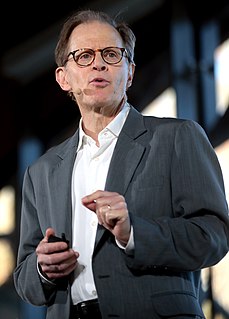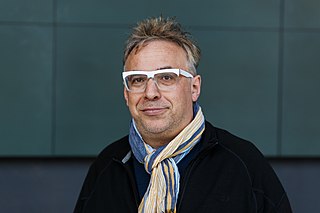A Quote by Daniel J. Siegel
Internal mental experience is not the product of a photographic process. Internal reality is in fact constructed by the brain as it interacts with the environment in the present, in the context of its past experiences and expectancies of the future. At the level of perceptual categorizations, we have reached a land of mental representations quite distant from the layers of the world just inches away from their place inside the skull. This is the reason why each of us experiences a unique way of minding the world. (pp. 166-167)
Related Quotes
From the internal reality, by which I means the totality of psychological experiences, it [science] actually separates us. Art, for example, deals with many more aspects of this internal reality than does science, which confines itself deliberately and by convention to the study of one very limited class of experiences the experiences of sense.
The analogy between the mind and a computer fails for many reasons. The brain is constructed by principles that assure diversity and degeneracy. Unlike a computer, it has no replicative memory. It is historical and value driven. It forms categories by internal criteria and by constraints acting at many scales, not by means of a syntactically constructed program. The world with which the brain interacts is not unequivocally made up of classical categories.
New insights fail to get put into practice because they conflict with deeply held internal images of how the world works...images that limit us to familiar ways of thinking and acting. That is why the discipline of managing mental models - surfacing, testing, and improving our internal pictures of how the world works - promises to be a major breakthrough for learning organizations.
As you transition from the past and future world of the mind to the awakened world of now, you will begin to experience yourself in an entirely new way. A way that is free of the pain and limitations of the past, and free of anxiety about the future. And you will begin to experience the abundance that is ever present in each moment.
Become aware of internal, subjective, subverbal experiences, so that these experiences can be brought into the world of abstraction, of conversation, of naming, etc. with the consequence that it immediately becomes possible for a certain amount of control to be exerted over these hitherto unconscious and uncontrollable processes.
We learn in the past, but we are not the result of that. We suffered in the past, loved in the past, cried and laughed in the past, but that's of no use to the present. The present has its challenges, its good and bad side. We can neither blame nor be grateful to the past for what is happening now. Each new experience of love has nothing whatsoever to do with past experiences. It's always new.
... what is faked [by the computerization of image-making], of course, is not reality, but photographic reality, reality as seen by the camera lens. In other words, what computer graphics have (almost) achieved is not realism, but rather only photorealism - the ability to fake not our perceptual and bodily experience of reality but only its photographic image.
The evolutionary vision is agnostic in regard to systems in the universe of greater complexity than those of which human beings have clear knowledge. It recognizes aesthetic, moral, and religious ideas and experiences as a species, in this case of mental structures or of images, which clearly interacts with other species in the world's great' ecosystem.

































